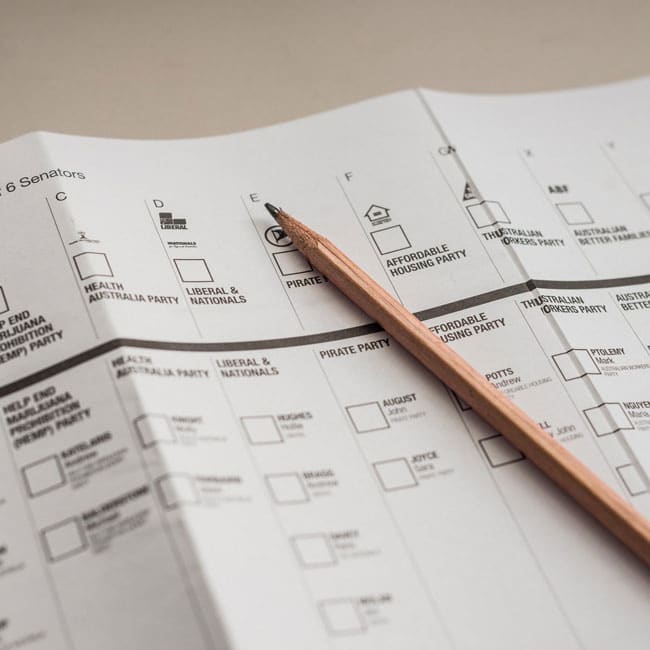
The erosion of public trust
Opinion + AnalysisPolitics + Human Rights
BY Simon Longstaff The Ethics Centre 17 SEP 2021
Christian Porter’s decision to accept an anonymous donation of one million dollars to help cover his personal legal costs has not merely raised questions about his personal judgement.
It has, once again, exposed larger issues about the extent to which some of our government ministers understand the demands of political leadership in a democracy.
To be clear, I do not see anything wrong, in general, with a person accepting financial support to cover the costs of litigation. Nor is there anything problematic about offering such support. There is not even a problem, in general, with such support being anonymous. So, if Mr. Porter were just an ‘ordinary citizen’, there would be little to discuss.
The controversy is solely related to the fact that Mr. Porter is a Member of Parliament and was a cabinet minister in the Federal Government led by Prime Minister Scott Morrison – a position that Porter freely chose to accept, presumably with knowledge of all that it requires. The fact that Mr. Porter resigned from the Ministry allays one source of concern. However, the issues at the heart of this controversy extend well beyond the treasury benches to encompass all serving MPs.
In fact, Mr. Porter’s case raises important issues of principle; namely, whether or not politicians (of all political persuasions) should be allowed, in our democracy, to receive substantial amounts of money by way of anonymous donations. In this, the acid test is not what is convenient (or not) for politicians and their supporters. Rather, the only consideration should be in relation to what supports, or undermines, the quality of our democracy.
Now, it could turn out to be the case that Mr. Porter has not broken any formal rules. Whether or not this is the case will be determined in due course. Yet, to think that this is simply a matter of compliance is, I believe, to miss the point. We are living through a time when the exemplary power of leadership is a potent force for both good and ill. And some of our politicians just don’t seem to understand this!
Ideally, I would prefer to cite examples from across the political spectrum. I am sure that they exist. Unfortunately, the spotlight tends to fall on those in power. So, when a government minister doles out public funds for a private political purpose it has a chilling effect on public trust in those who govern, even if what was done is technically within the rules. Then we have the case of Christian Porter – which, as noted above, seems to offer evidence of either ignorance of, or indifference to, basic standards of good governance.
We might all genuinely sympathise with the desire of a dad to be with his children on Father’s Day. However, when the Prime Minister takes advantage of an opportunity not available to hundreds and thousands of their fellow-citizens, it leaves the impression that there is one rule for the powerful and another for the rest of us.
As noted above, the issue I am concerned about does not concern compliance with the rules. It’s not that such questions are unimportant. It’s just not the focus of this article. Rather, I am worried about the effects of a continuing erosion of trust in our government. Some people might think this to be a trivial matter. Perhaps it is when nothing much is at stake. However, those are not the times in which we are living.
The COVID19 pandemic has been the most significant threat to Australia in the past 50 years. Furthermore, the response to that threat has largely lain in the hands of the community as a whole. Governments can lead, they can put in place policies and procedures, they can supply critical resources like vaccines and safe quarantine facilities. Yet, none of that will be to good effect unless ordinary Australians accept the costs of lockdowns, wear masks, remain socially distant, be vaccinated, etc. This requires the public to look beyond self-interest. The community as a whole has to have a concern for the general welfare of society. Most importantly, we need to be able to trust the judgement and advice of those who govern.
At least in part, this depends on us believing that our political leaders are in this with us; that we are ‘all in the same boat’.
Also, we need to believe that our politicians will act solely in the public interest and that if, for some reason, they do not, then they will be held to account with at least the same degree of rigour that applies to the rest of us.
Leaders should not wait until a time of crisis to demonstrate their integrity. Every decision – including those that do not ‘seem to matter’ – builds (or undermines) the ethical capital upon which politicians must draw at times such as these. That is, the character of political leadership is established in fine detail over time. Mere compliance with the rules is the bare minimum – nothing more. The real ‘weight’ lies in countless acts of discretion not merely in terms of substance but equally in terms of their symbolic significance.
We should all realise that this imposes an extraordinary burden on our politicians. Their public service requires more of them than we demand of ourselves. However sympathetic we might be to their plight, that is the price that must be paid by those who choose to govern. Alas, this is the lesson that a number of our political leaders seem not to have learned.
Ethics in your inbox.
Get the latest inspiration, intelligence, events & more.
By signing up you agree to our privacy policy
You might be interested in…
Opinion + Analysis
Climate + Environment, Politics + Human Rights, Relationships
A burning question about the bushfires
Opinion + Analysis
Politics + Human Rights, Climate + Environment
What we owe each other: Intergenerational and intertemporal justice
Opinion + Analysis
Relationships, Politics + Human Rights
How to have a difficult conversation about war
Opinion + Analysis
Politics + Human Rights




